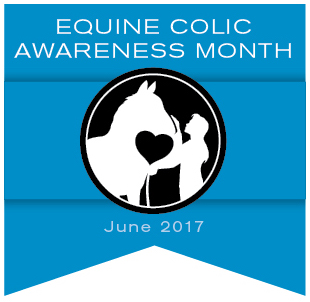Most horse owners know the basic signs and the risks of equine colic, but the truth is that there are also a lot of myths that circulate the barn aisles. Test your knowledge and see how much you really know about colic.
1. If you limit your horse’s access to quality hay/grass, it will lower his risk of colic.
False. Horses are natural grazers, they weren’t meant to be stalled or go without food for long periods of time. Reducing access to quality hay and grass – or even feeding it in just two large meals a day – may actually increase the risk for colic. One of the best ways to ensure your horse’s gut is functioning smoothly is to provide free-access to quality forage.
2. Switching hay can cause colic.
True. A horse’s GI tract contains microbes that will change according to what sort of feed they are digesting. Some feed and hay require different levels and types of microbes, and switching between types of hay, providers, or even different cuttings can throw off the microbial balance and increase colic risk.
If you change your horse’s hay or feed, make sure you do it slowly over the course of two weeks.
3. Yawning is a sign of colic.
True. If your horse starts yawning often, he could be experiencing colic. This is one of those signs that commonly gets overlooked but should go in the category of “basic colic symptoms” including rolling, girthiness, and laying down for long periods of time. Note, just because your horse yawns, doesn’t mean you should be calling the vet. If you notice he is yawning frequently and starting to show those basic colic symptoms, then consider calling the vet.
4. Impaction colic happens more in the summertime.
False. Impaction colic happens more in the winter. Why? Horses are more likely to drink less and become dehydrated, move less, and the way we feed them tends to change. All of this contributes to an increased risk for impaction colic during cold months.
5. When your horse is colicking you should keep him walking around.
False. While it is important to walk your horse a bit when he is colicking, if he wants to lay down, let him. Unless your horse is rolling and thrashing, you should let him do what he wants. Too much walking can actually increase dehydration, making colic worse.
6. Poor teeth can lead to colic.
True. If your horse has bad teeth, he won’t be able to chew his feed or hay properly, which can lead to blockages in the digestive tract. This is something to watch out for especially in older horses who have put a lot of wear and tear on their teeth.
Be sure to have your horse’s teeth checked by your veterinarian at least 1-2 times per year.
7. Diets low in concentrates increase a horse’s risk for colic.
False. Diets high in concentrates contribute greatly to colic risk. The simple carbohydrates in concentrates are difficult for horses to digest, and can throw off healthy digestive function – especially in the hindgut.
8. A psychologically stressed horse has a higher risk for colic.
True. A horse who is under stress, whether that’s because of show season or a change in environment, has a higher risk for colic. This is because stressed horses generally stop eating and drinking at a normal rate. It’s always good to monitor the level of stress your horse is in, and make sure he is as comfortable as possible.
9. If you think your horse is colicking, try to get him to eat something.
False. A colicking horse should be taken off their feed until the symptoms have subsided. Feeding a colicking horse may exacerbate the problem, especially if there is an impaction.
10. Horses with colic will have a higher heart rate than normal.
True. Familiarize yourself with your horse’s normal heart rate, that way if you suspect colic, you can check his pulse rate to see if it is higher than usual. Normally, the more severe the colic, the more rapid the heartbeat.
Whether you knew all 10 answers or just a few, there are several things that you as a horse owner can do to prevent colic.
Join the Crusade Against Equine Colic today, share your story and share with your fellow horse lovers.







I leave a response each time I like a article on a
site or if I have something to contribute to the conversation. Usually it’s triggered by the
passion displayed in the article I read. And on this post How
Much Do You Really Know About Colic? : Crusade Against Equine Colic.
I was moved enough to drop a thought 😉 I do have a couple of questions for you if you
don’t mind. Could it be only me or do some of the comments come across like left by brain dead visitors?
😛 And, if you are posting on additional online social sites, I would like to keep up
with everything new you have to post. Would you make a list all of your communal sites
like your twitter feed, Facebook page or linkedin profile?